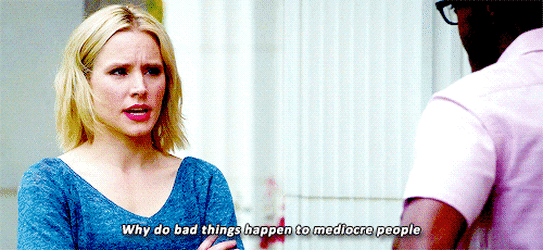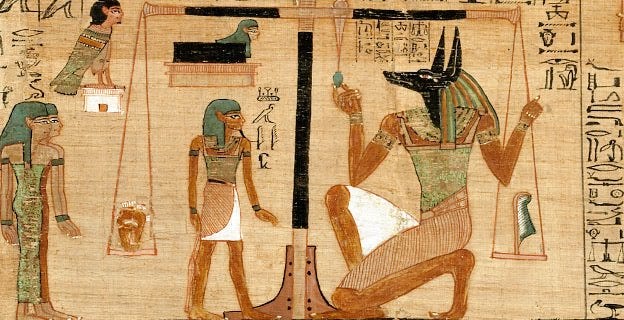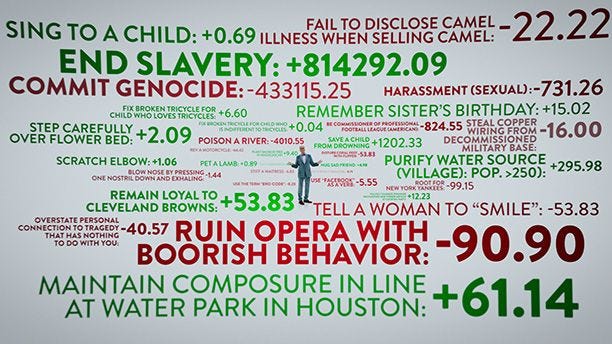OK let’s start off with an easy math problem:
2011 was nine years ago and 2015 was five years ago. I wrote a short story called “Here. After.” in 2011. In 2015, TV producer Michael Schur pitched an idea for a sitcom which eventually became “The Good Place”. Assume that both works involve a snarky female protagonist dying in a freak accident, viewing a powerpoint about the afterlife and a rigid system in which earthly deeds are valued and assigned points, and then having to reckon with the fact that the way she lived perhaps will not allow her to access the good afterlife. Who copied who?
One of the above pieces is critically acclaimed, has won numerous awards, and was nominated for several Emmys. The other received lukewarm reviews from my Intermediate Fiction class in college…

Even if NBC somehow really hacked my college Toshiba laptop (which I imagine would be akin to hacking a toaster) and copied my manuscript, I wouldn’t be mad for two reasons. First, “The Good Place” is one of the best TV shows of our time- it goes far beyond my short story to confront deep philosophical quandaries all while balancing satisfying emotional growth and continuous humor. (Seriously, if you haven’t done so, watch “The Good Place”.) Second, the idea of an afterlife revolving around a quantifiable point system is not my original idea - by a long shot.

Famously, the ancient Egyptian deceased would be met by the god Anubis who weighed their heart on a scale - a measuring instrument of discrete units (math!). If the heart was light as a feather, the departed could proceed to paradise. If it was heavier, then the spirit was devoured. Christian artists later copy+pasted this concept, depicting Saint Michael as a weigher of souls on Judgement Day. And thus began the time-honored tradition of people named Michael plagiarizing cool ideas about the afterlife.
It makes sense for people to want to quantify their deeds, to determine the value of a life, to enter into the ethereal calculus of sin and service. Does a wrong undo a right, and vice-versa? And then how to factor in the magnitude of each good or bad deed: it’s bad to not buy fair trade, but it’s also bad to cause hundreds of thousands of deaths by withholding a crucial medication for profit. Surely that’s not a 1:1. In “The Good Place” (and in my short story) behaviors are assigned a point value that accrues as people live their lives - flawed, certainly, but interesting.

In one episode, the characters struggle with the famous trolley problem, in which a runaway trolley nears a fork in the tracks and someone has to choose between killing one person by pulling a lever or doing nothing and letting five people die. Are we as responsible for our inaction as we are for our actions? Is there a lesser of two evils? This can be manipulated endlessly: What if the solo person is a friend of yours? What if one of the five is going to murder three others if you spare them? These challenges push us to think critically about our conceptions of right and wrong and complicate the math behind our decisions and the impacts they have.
While an ethical point system (or a karma credit card, if ya nasty) is an interesting framework to puzzle with and explore, it’s not something I actually believe in. Ethics problems, in contrast to Math, contain few “right and wrong” answers even while using the language of “right” and “wrong”. Specific context of every moral decision matters, and there are some situations where it’s right to do the wrong thing.

I don’t believe in a best way to live - you just do the best you can. I think that optimizing for goodness or keeping a careful count of your moral debts and credits distracts you from living. You have to consider your own happiness, in addition to everyone else in the world. We all can make the world a better place, but it’s also okay for that impact to be small.
The metaphor of a scale that weighs your soul makes me think of unrealistic body standards: a feather-weight heart is unrealistic for many people, and probably unhealthy for most.
—-
Don’t forget to vote on next week’s topics! Thanks so much for participating!



